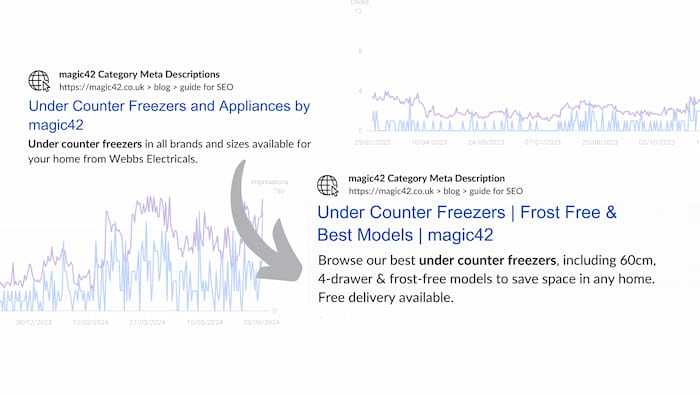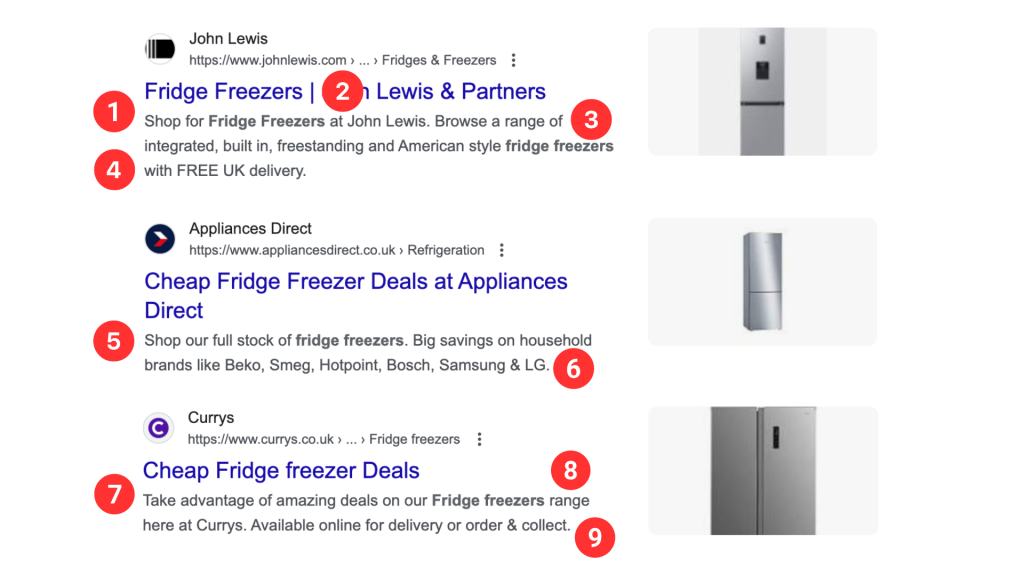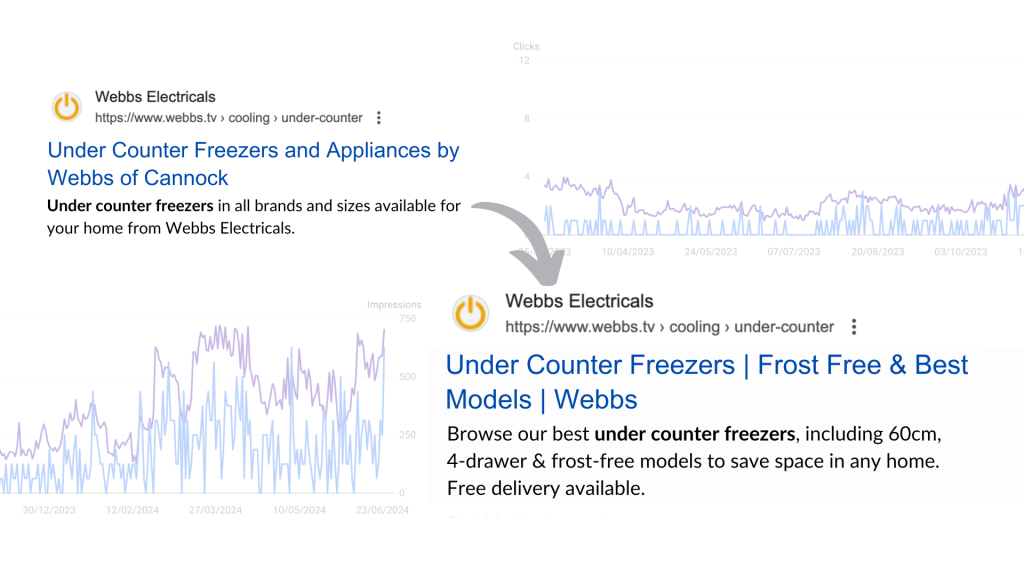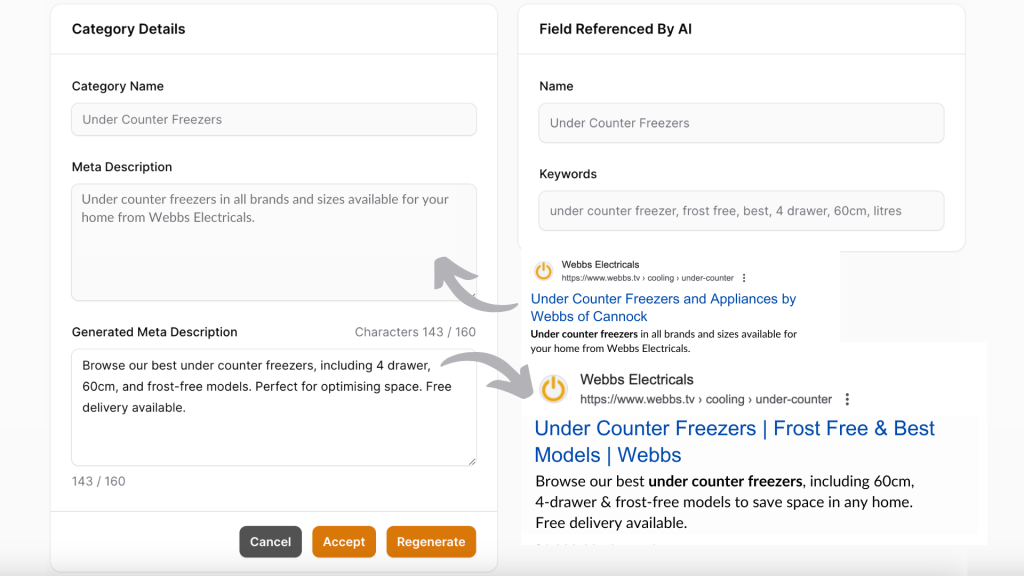
Category meta descriptions are important to optimise as they’re designed to bring customers to your product listing pages to find the type of product they’re searching for. Unlike specific product page meta descriptions, category meta descriptions need to include key phrases that are enticing for a collection of products and match user search queries.
As the eCommerce category meta descriptions should compliment the category meta title of each page, we’ve outlined best practices to make sure your meta descriptions are up to scratch.
We’ve picked out three successful examples of category meta descriptions from other eCommerce businesses, highlighting what techniques they have used. Here, we’ll be using the search term ‘fridge freezers’:

1: Each category description will be limited to 160 characters at most, before search result pages cut off the copy. In the first sentence, it’s important to display your primary keyword phrase (‘Fridge Freezers’ in this example) to help search engines understand the purpose of the page better and display it to users searching for that query.
2: Mentioning your company brand can help users locate your business specifically, but may only be useful for larger companies with well-known names. John Lewis are a well-established UK retailer, so have mentioned their name in their meta title and meta description.
3: Users may also be searching for specific types of fridge freezer, meaning it’s useful to include popular synonyms in your eCommerce category meta description. In this example, ‘integrated’, ‘built in’, ‘freestanding’ and ‘American style’ have all been used next to the phrase ‘fridge freezers’. It’s worth noting that as ‘American style’ is directly next to ‘fridge freezers’, this phrase may rank even better than the others as it’s a ‘longtail’ keyword.
4: Many people will be looking for the cheapest delivery for appliances too. The phrase ‘FREE DELIVERY’ not only helps it rank for users searching for fridge freezers with this, but also catches the eye by specifically being at the end of the category meta description. It should be noted that the use of capital letters for the full phrase doesn’t help it rank any better in Search Engine Result Pages (SERPs).
5: It’s often worth including a call to action in the meta description, such as ‘Buy’ or ‘Shop’ at the start. This can help incite an action from potential customers.
6: The category meta description is an ideal place to mention specific brands that customers may be searching for, such as ‘Beko’, ‘Smeg’, ‘Hotpoint’, ‘Bosch’, ‘Samsung’ and ‘LG’.
7: Often, customers will be searching for deals or discount prices on more expensive items, such as fridge freezers. Whilst keywords such as ‘deals’ and ‘offers’ may get used in the meta title, sometimes it’s worth mentioning this in the category meta description, such as ‘amazing deals’.
8: The category page for your products will include a selection of items, so mentioning a ‘range’ in the meta description will show that you provide several options. This will cater to multiple people who may not necessarily know what type of ‘fridge freezer’ they want, yet. This is important in attracting customers open to a variety of options in that category.
9: ‘Available online’ not only gives peace of mind for stock availability, but the ‘delivery’ or ‘order & collect’ phrases give customers options to pick for their convenience. Some may be searching specifically for delivery, whereas others may be entering search terms for collection. These terms, best mentioned at the end of a meta description, can help rank the category page better for those search queries. If there is a long warranty period for the fridge freezer, it’s also good to mention that at the end.
Google Search Console can help you identify the terms and keywords your customers are searching. These can then be applied to your Product Listing Page meta titles and complimenting category meta descriptions to help them rank better against popular but applicable search queries. Armed with these keywords and the above breakdown, you could optimise your category meta information accordingly.
Optimising your category page meta description is crucial for improving search engine result rankings. Without optimisation, your category page could be buried under competitors who use more relevant keywords, making it harder for potential customers to find your site. This will impact the visibility of your category pages as well as their click-through rates.
Auto-generated eCommerce category meta descriptions aren’t uncommon either, where a snippet of category page copy is pulled through as a preview in search engines. The problem with this is that the copy often cuts off part way through and misses the opportunity to enhance the page's search engine rankings. Using a meta description that has a deeper focus on search queries and applicable keywords, a category page will often rank higher than a page that has never been optimised.

Investing time to refine your category meta information is therefore essential. Just as you optimise search ads (Google Ads) and email subject lines for better click-through rates, you should apply the same effort to your site's SEO, including category pages.
However, search engine rankings don't tend to improve overnight. Google needs time to index the page, evaluate search results, and more. Through careful monitoring, you will see your page rankings gradually change over time and hopefully improve. Even small tweaks can boost the page’s visibility and product sales over time.
Optimising your category meta title and category meta descriptions is worth doing, but can be time-consuming to do at scale. This is because each category page requires access to a tool such as Google Search Console, keyword research, editing the description in your platform and then monitoring the results. However, this can be sped up with the use of AI…
Our new AI eCommerce tool can integrate with your site platform, including Magento, Shopify and WooCommerce, to generate meta titles, meta descriptions and more for both product and category pages. This works by the tool referencing keywords from your Google Search Console, as well as your existing data from areas such as your category page meta descriptions, then optimising the meta information. The more data an AI tool has to reference from real-world data, the better the output will be.

With our eCommerce AI tool, we can streamline the process of scouring 100s of keywords to optimise category page meta details at speed and scale. That’s because each prompt has been keenly written and tailored by our team to best help eCommerce businesses. Through these complex prompts written by humans, matching your tone of voice and referencing specific information, our AI tool can produce a high calibre output for SEO.
Interested in how our AI app for eCommerce can help? We share more details in our blog on five ways we enhance products using our AI app. We also have advice on optimising meta titles in our guide on how to create great eCommerce category meta titles for PLPs.
Find out the full details to enhance your category pages using our eCommerce AI app.



